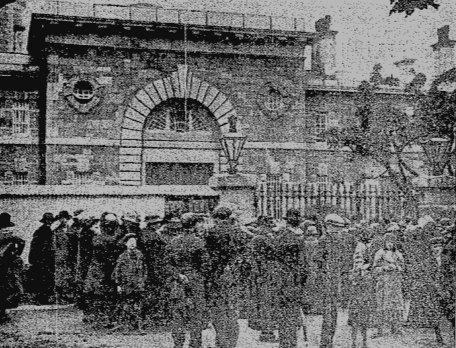Four die in Mountjoy escape attempt days after Dáil discusses ill-treatment of prisoners
Dublin 11 October 1922 – Four men were killed and three wounded during a failed escape attempt made by Irregular prisoners held in Mountjoy Jail yesterday.
The dead include three prison guards and one prisoner – firearms were used by both sides in the clashes.
Yesterday morning, when the gates leading to Wing C of the jail were opened to allow entry to prisoners specially detailed to carry breakfast to their comrades, a number of prisoners gathered and rushed at the guards, firing revolvers as they did. Privates Gaffney and Kearns, were killed. A third guard, Private Gallagher, died of his wounds later at the Mater hospital.
The prisoner killed in the attempted escape has been named as Peadar Breslin.
After calm was restored and three lorry loads of reinforcements from Portobello Barracks arrived, all prisoners and their cells were searched. The following arms and ammunition were found:
• Three revolvers
• A Mills bomb
• Several home-made bombs
• Small arms ammunition
• Explosive chemicals
Following the discovery, President Cosgrave said that the provisional government would initiate an inquiry to ascertain how prisoners came to possess arms.
Treatment of prisoners
The tragic incidents at Mountjoy came just days after the
Dáil discussed charges of ill-treatment made by irregular
prisoners in military barracks and jails.
Minister for Home Affairs, Kevin O’Higgins, confessed that there was congestion in the jails and this was to be regretted. However, he insisted that this was an inevitable result of having ‘more men in arms against this native administration… than there were in arms against the British throughout the length and breadth of the country when the British were here.’
Dismissing the charges of physical ill-treatment, O’Higgins remarked:
‘Some of us were there ourselves and some of us were through what we call prison-rows ourselves, and we know, we always considered it good business to force our guards to take action against us which we could use as propaganda against the government that the guards were responsible to. That is going on now. The men in the jails consider it a point of honour and principle and other high-sounding things to regularly force their guards to take measures against them, which their lady-friends outside can write up on the walls.’
The accusations levelled against government forces are not confined to their conduct behind prison walls. An inquest into the death of three teenagers who were shot dead near Clondalkin has issued subpoenas for the attendance of two national army officers. The two officers were in a military lorry which picked up the three boys when they were found posting republican literature. All three were found dead with numerous wounds on their bodies.
The victims have been named as Edwin Hughes, 17, of Clonliffe Road; Joseph Rogers, 16, of St Brigid’s Road; and Bernard Holohan, 17, of St Ignatius Road.

Kevin O’Higgins ( Image: Irish Life, 5 May 1922 )
[Editor's note: This is an article from Century Ireland, a fortnightly online newspaper, written from the perspective of a journalist 100 years ago, based on news reports of the time.]





















